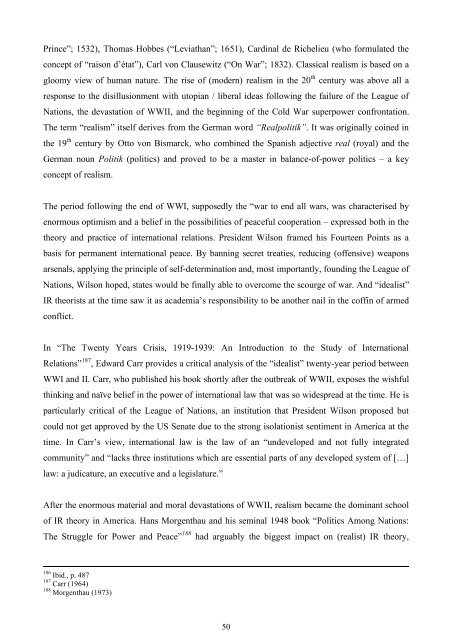Ethnocentric vs. Regiocentric Consolidation in the Aerospace and
Ethnocentric vs. Regiocentric Consolidation in the Aerospace and
Ethnocentric vs. Regiocentric Consolidation in the Aerospace and
You also want an ePaper? Increase the reach of your titles
YUMPU automatically turns print PDFs into web optimized ePapers that Google loves.
Pr<strong>in</strong>ce”; 1532), Thomas Hobbes (“Leviathan”; 1651), Card<strong>in</strong>al de Richelieu (who formulated <strong>the</strong><br />
concept of “raison d’état”), Carl von Clausewitz (“On War”; 1832). Classical realism is based on a<br />
gloomy view of human nature. The rise of (modern) realism <strong>in</strong> <strong>the</strong> 20 th century was above all a<br />
response to <strong>the</strong> disillusionment with utopian / liberal ideas follow<strong>in</strong>g <strong>the</strong> failure of <strong>the</strong> League of<br />
Nations, <strong>the</strong> devastation of WWII, <strong>and</strong> <strong>the</strong> beg<strong>in</strong>n<strong>in</strong>g of <strong>the</strong> Cold War superpower confrontation.<br />
The term “realism” itself derives from <strong>the</strong> German word “Realpolitik”. It was orig<strong>in</strong>ally co<strong>in</strong>ed <strong>in</strong><br />
<strong>the</strong> 19 th century by Otto von Bismarck, who comb<strong>in</strong>ed <strong>the</strong> Spanish adjective real (royal) <strong>and</strong> <strong>the</strong><br />
German noun Politik (politics) <strong>and</strong> proved to be a master <strong>in</strong> balance-of-power politics – a key<br />
concept of realism.<br />
The period follow<strong>in</strong>g <strong>the</strong> end of WWI, supposedly <strong>the</strong> “war to end all wars, was characterised by<br />
enormous optimism <strong>and</strong> a belief <strong>in</strong> <strong>the</strong> possibilities of peaceful cooperation – expressed both <strong>in</strong> <strong>the</strong><br />
<strong>the</strong>ory <strong>and</strong> practice of <strong>in</strong>ternational relations. President Wilson framed his Fourteen Po<strong>in</strong>ts as a<br />
basis for permanent <strong>in</strong>ternational peace. By bann<strong>in</strong>g secret treaties, reduc<strong>in</strong>g (offensive) weapons<br />
arsenals, apply<strong>in</strong>g <strong>the</strong> pr<strong>in</strong>ciple of self-determ<strong>in</strong>ation <strong>and</strong>, most importantly, found<strong>in</strong>g <strong>the</strong> League of<br />
Nations, Wilson hoped, states would be f<strong>in</strong>ally able to overcome <strong>the</strong> scourge of war. And “idealist”<br />
IR <strong>the</strong>orists at <strong>the</strong> time saw it as academia’s responsibility to be ano<strong>the</strong>r nail <strong>in</strong> <strong>the</strong> coff<strong>in</strong> of armed<br />
conflict.<br />
In “The Twenty Years Crisis, 1919-1939: An Introduction to <strong>the</strong> Study of International<br />
Relations” 187 , Edward Carr provides a critical analysis of <strong>the</strong> “idealist” twenty-year period between<br />
WWI <strong>and</strong> II. Carr, who published his book shortly after <strong>the</strong> outbreak of WWII, exposes <strong>the</strong> wishful<br />
th<strong>in</strong>k<strong>in</strong>g <strong>and</strong> naïve belief <strong>in</strong> <strong>the</strong> power of <strong>in</strong>ternational law that was so widespread at <strong>the</strong> time. He is<br />
particularly critical of <strong>the</strong> League of Nations, an <strong>in</strong>stitution that President Wilson proposed but<br />
could not get approved by <strong>the</strong> US Senate due to <strong>the</strong> strong isolationist sentiment <strong>in</strong> America at <strong>the</strong><br />
time. In Carr’s view, <strong>in</strong>ternational law is <strong>the</strong> law of an “undeveloped <strong>and</strong> not fully <strong>in</strong>tegrated<br />
community” <strong>and</strong> “lacks three <strong>in</strong>stitutions which are essential parts of any developed system of […]<br />
law: a judicature, an executive <strong>and</strong> a legislature.”<br />
After <strong>the</strong> enormous material <strong>and</strong> moral devastations of WWII, realism became <strong>the</strong> dom<strong>in</strong>ant school<br />
of IR <strong>the</strong>ory <strong>in</strong> America. Hans Morgenthau <strong>and</strong> his sem<strong>in</strong>al 1948 book “Politics Among Nations:<br />
The Struggle for Power <strong>and</strong> Peace” 188 had arguably <strong>the</strong> biggest impact on (realist) IR <strong>the</strong>ory,<br />
186 Ibid., p. 487<br />
187 Carr (1964)<br />
188 Morgenthau (1973)<br />
50

















